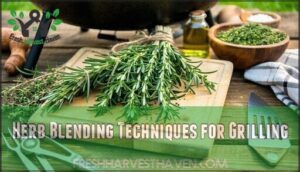This site is supported by our readers. We may earn a commission, at no cost to you, if you purchase through links.

Pair rosemary and thyme for lamb, basil and lemon verbena for chicken, or dill and chives for fish.
If you want global flavors, try jerk seasoning with allspice and thyme, or Italian blends with oregano and basil.
Herbs add layers of aroma and taste—like giving your grill a passport. Fresh herbs bring brightness, while dried herbs deepen the flavor.
Mix and match for creative blends, and don’t be afraid to experiment. There’s a world of flavor waiting just beyond your backyard—let’s see what’s cooking next.
Table Of Contents
- Global Herb Combinations for Grilling
- Classic Herb Pairings for Grilled Meats
- Best BBQ Herb Combinations
- Growing Your Own Grilling Herbs
- Herb-and-Produce Pairings for Grilled Dishes
- Using Fresh and Dried Herbs for Grilling
- Herb Blending Techniques for Grilling
- Herb Safety and Storage for Grilling
- Herb Substitutions and Alternatives for Grilling
- Grilling With Herbs for Different Diets and Restrictions
- Frequently Asked Questions (FAQs)
- What herbs are best for BBQ?
- What herbs go well with each other?
- Which herbs are best for cooking?
- What herbs go well with meat?
- How many herbs can you use in a BBQ mix?
- What herbs go well with a dish?
- What herbs are good for grilling?
- What are the best herb combinations?
- What herb pairs best with steak?
- What herbs go well with grilled chicken?
- Conclusion
Global Herb Combinations for Grilling
You’ll discover that international spice blends can transform your grilling game from ordinary to extraordinary with just the right combination of herbs.
These global flavor profiles bring authentic tastes from around the world directly to your backyard barbecue, with complete concepts of flavor that can elevate your dishes, and global inspiration to guide your grilling.
Unlock world-class flavors at home—let global herb blends inspire your next backyard barbecue masterpiece.
Blackening Seasoning With Paprika and Cayenne
Three bold spices make blackening seasoning your secret weapon for transforming ordinary grilled meats into smoky flavors masterpieces. This Cajun spice blend combines paprika’s deep color with cayenne’s fiery punch, creating pepper mixtures that deliver restaurant-quality results on your backyard grill.
The beauty lies in customization—start with less cayenne and build heat gradually. Smoked paprika elevates the blend’s complexity, while garlic and thyme round out the profile perfectly.
- Heat Control: Start with 1/4 teaspoon cayenne per tablespoon paprika, adjusting upward
- Color Power: Sweet or smoked paprika creates that signature blackened crust
- Protein Perfect: Works brilliantly on firm fish, chicken thighs, or ribeye steaks
This grilling herb combination creates an irresistible crust when seared over high heat, sealing in juices while delivering authentic spicy blends that’ll have neighbors asking for your secret.
Italian Seasoning With Basil and Oregano
Italian seasoning’s marriage of basil and oregano creates Mediterranean magic on your grill.
Basil’s sweet, peppery notes complement oregano’s earthy intensity, forming herb blends that transform ordinary grilled dishes into Mediterranean cuisine masterpieces.
These Italian flavors work beautifully on chicken, where basil uses shine through gentle heat, while oregano benefits from longer cooking times that develop its robust character.
Mix equal parts for balanced herb combinations for grilling, or adjust ratios based on your preference.
Mediterranean grilling herbs like these pair perfectly with olive oil and garlic, creating aromatic marinades that infuse meats and vegetables with authentic Italian seasoning depth.
Jerk Seasoning With Allspice and Thyme
Jerk seasoning transforms your grilled meats into Caribbean flavor powerhouses, combining aromatic allspice with earthy thyme for authentic island heat.
This spice blend creates complex layers that penetrate deep into proteins, delivering that signature smoky-sweet kick every backyard chef craves.
Perfect your herb ratios with these essential jerk recipes components:
- Ground allspice berries – the backbone providing warm, nutmeg-cinnamon notes
- Fresh thyme leaves – adds herbaceous brightness that cuts through richness
- Scotch bonnet peppers – delivers authentic fire and fruity heat
- Brown sugar crystals – balances intense spices with caramelized sweetness
- Fresh lime zest – brightens the blend with citrusy Caribbean twists
These grilling herb combinations work exceptionally well on chicken, pork, and beef, creating restaurant-quality results at home.
Chinese Five Spice With Star Anise and Fennel
Chinese five spice transforms your grilling game with its complex blend of star anise and fennel seeds creating sweet, licorice-forward notes.
This traditional spice blend combines cinnamon, cloves, and Sichuan peppercorns for a complete flavor profile that’ll make your neighbors peek over the fence.
Aromatic Chinese five spice transforms grilled dishes with its perfect blend of sweet, earthy, and tingly flavors, adding irresistible depth.
You’ll want to rub this mixture on pork shoulder or chicken thighs about 30 minutes before grilling.
The fennel seeds provide earthiness while star anise delivers that distinctive sweetness that caramelizes beautifully over high heat.
For grilling tips, try it on salmon or portobello mushrooms too.
These grilling herb combinations work best when you balance the anise intensity with milder spices.
Mix your own blend by adjusting ratios—more fennel for earthiness, extra star anise for sweetness.
This versatile spice blend elevates everything from ribs to vegetables.
Classic Herb Pairings for Grilled Meats
When you’re grilling meats, the right herb combinations can transform ordinary cuts into restaurant-quality dishes that’ll have your guests asking for your secret.
These classic pairings work because they complement each meat’s natural flavors while adding aromatic depth that stands up to high-heat cooking, making them a key factor in creating restaurant-quality dishes.
Rosemary and Thyme for Grilled Lamb
Rosemary and thyme create the ultimate power couple for Grilled Chops, delivering piney and earthy notes that perfectly complement lamb’s rich flavor.
Grilled lamb reaches new heights with rosemary and thyme—earthy, aromatic, and unforgettable every single time.
These herbs for grilling meat contain antioxidants that reduce harmful compounds by 60% during high-heat cooking.
- Create Lamb Marinades with olive oil, garlic, and lemon for 2-4 hours
- Apply Herb Crusts using a 2:1 rosemary-to-thyme ratio before grilling
- Finish with Rosemary Glaze or Thyme Rubs for enhanced crust formation
Garlic Chives and Fennel for Grilled Fish
Garlic chives’ delicate onion notes perfectly complement fennel’s subtle licorice essence when grilling fish.
These grilling herbs create exceptional flavor profiles through strategic herb infusion:
- Choose firm white fish like halibut or sea bass for ideal marinade recipes absorption
- Mix crushed fennel seeds with chopped garlic chives for aromatic dry rubs
- Apply grilling techniques that allow gentle heat penetration, preventing delicate fish selection from overcooking
Basil and Lemon Verbena for Grilled Chicken
When you’re grilling chicken, pairing basil and lemon verbena creates a flavor profile that’s both bold and invigorating.
These herbs for grilling chicken work best when brushed on with olive oil, locking in moisture and herb proportions.
Try this citrus herb marinade for innovative grilling techniques and memorable results with different chicken varieties.
Here’s a handy table to guide your herb combinations for grilling herb recipes:
| Herb | Flavor Notes | Key Benefit |
|---|---|---|
| Basil | Sweet, peppery | Enhances richness |
| Lemon Verbena | Citrusy, fresh | Adds brightness |
| Olive Oil | Smooth, rich | Binds flavors well |
Parsley and Sage for Grilled Vegetables
If you loved basil and lemon verbena with chicken, wait till you try parsley and sage with grilled vegetables. These herbs for grilling vegetables offer earthy flavor profiles that shine with squash, cauliflower, or tomatoes.
For best results, use fresh herbs and:
- Toss veggies in olive oil
- Sprinkle parsley and sage generously
- Pair with lemon dressing or feta
Masterful herb combinations for grilling. Understanding summer herb basics is essential to creating delicious and well-balanced dishes, with a focus on grilling vegetables.
Best BBQ Herb Combinations
You’ll discover that the right herb combinations can transform your grilled dishes from ordinary to extraordinary with just a few simple blends.
These three classic BBQ herb combinations will give you the foundation to create restaurant-quality flavors on your backyard grill.
Sweet and Spicy With Basil, Marjoram, and Thyme
Transform your barbecue game with this powerhouse trio that balances sweet aromatics with gentle heat.
This combination creates complex flavor profiles that work beautifully across multiple proteins and vegetables.
- Basil blends deliver fresh sweetness that complements smoky char
- Marjoram uses include adding mild spice without overwhelming delicate foods
- Thyme pairings provide earthy depth that anchors the lighter herbs
- Spice levels remain approachable while building sophisticated taste layers
These best herbs grilling enthusiasts swear by work as dry rubs or marinades.
Mix two teaspoons basil, one teaspoon marjoram, and half teaspoon thyme per pound of meat for ideal results.
To further enhance your grilling experience, consider exploring grilling herbs to discover new flavors and techniques.
Classic BBQ With Rosemary and Thyme
Rosemary and thyme create the backbone of authentic BBQ herb combinations.
These robust herbs withstand high heat while infusing grilled meats with earthy, piney notes. Fresh rosemary blends deliver intense aromatics, while thyme pairings add subtle mint undertones.
Apply these herb infusions directly to steaks or chicken thirty minutes before grilling. Their bold BBQ flavors complement wood smoke beautifully, making grilling with herbs both simple and rewarding for backyard pitmasters with authentic BBQ herb combinations.
Fresh and Fruity With Dill and Chives
Brightness defines the magic when you combine dill and chives for Fresh Flavors that transform ordinary grilled dishes.
These herb combinations for grilling deliver zesty Fruity Twists that complement summer produce perfectly.
Dill Recipes shine with grilled salmon, while Chive Pairings enhance corn and potatoes beautifully.
Grilling with herbs becomes effortless when you add these fresh herbs grilling favorites at the end of cooking to preserve their delicate profiles.
Create dill-infused marinades or sprinkle chives over grilled vegetables for instant elevation.
These Herb Combinations offer endless possibilities for creative outdoor cooking adventures.
Growing Your Own Grilling Herbs
Growing your own grilling herbs guarantees you’ll always have fresh ingredients at your fingertips for your next barbecue session.
You can cultivate essential herbs like rosemary, thyme, chives, and fennel right in your backyard or even in containers on your patio, ensuring you have flavorful ingredients.
Rosemary Growing Guide
Want to master growing herbs for your grilling adventures? Soil preparation sets the foundation—use well-drained, sandy soil with pH 6-7.
Plant rosemary in warm conditions above 65°F, ensuring climate control through container planting for cold regions.
- Select sunny spots receiving 6-8 hours daily sunlight
- Space plants 24-36 inches apart for proper airflow
- Apply balanced herb fertilization once per growing season
- Monitor for aphids and powdery mildew during pest management
Rosemary pruning after flowering maintains bushy growth while providing fresh herbs grilling material.
This herb gardening tips approach creates perfect herbs for grilling fish and other dishes.
For successful cultivation, understanding rosemary seed selection is vital for healthy growth.
Rosemary requires specific conditions to thrive, making it essential to choose the right seeds for your needs, which is key for achieving the best results.
Thyme Growing Guide
Thyme planting becomes your next garden victory after mastering rosemary’s woody resilience. This Mediterranean herb thrives in spring when soil temperatures hit 70°F. Choose well-drained soil with a pH around 7, then plant seeds half an inch deep in full sunlight.
Here’s your thyme care roadmap:
| Growing Phase | Key Requirements |
|---|---|
| Planting | 70°F soil, pH 7, ½" depth |
| Growing | Full sun, well-drained soil |
| Harvesting | Before flowering, morning cuts |
Thyme pruning keeps plants bushy and productive. Snip stems regularly, leaving two inches for regrowth. Harvest timing matters most in early morning when oils concentrate in leaves. Water sparingly since thyme tolerates drought better than soggy conditions. This hardy herb handles winter outdoors in most climates, making it perfect for year-round herb gardening and creating stellar herb combinations for grilling. For ideal growth, understanding thyme seed selection is vital to achieve a healthy and thriving thyme plant.
Chives Growing Guide
Growing chives for your grilling herb guide starts with soil preparation – plant seeds ¼ inch deep in well-drained, fertile soil.
These hardy perennials excel in herb gardening for beginners, requiring minimal fertilization and basic pest control for aphids.
Chive harvest begins when plants reach 6 inches tall. Chive care involves regular watering and occasional trimming.
Their mild onion flavor makes them perfect for herb combinations for grilling, supporting your herb cultivation goals with reliable, flavorful results.
For ideal growth, understanding herb garden basics is essential to create a thriving environment.
Fennel Growing Guide
If you’re ready to expand your herb gardening for beginners, fennel’s a smart pick.
Fennel seeds need nutrient-rich, well-drained soil and full sun—think soil temperature between 50°F and 70°F for best results.
Plant seeds just 1/8 inch deep, and watch for pests; a bit of fennel care goes a long way.
Harvest timing matters: grab bulbs when they’re tennis ball-sized for that sweet, licorice flavor.
Fennel varieties shine on the grill, especially with fish or roasted veggies.
- Soil Temperature: 50°F–70°F
- Fennel Care: Pest control
- Harvest Timing: Tennis ball-sized bulbs
Herb-and-Produce Pairings for Grilled Dishes
You’ll get the most flavor on the grill when you match fresh herbs with the right produce, like basil with tomatoes or oregano with eggplant.
Pairing herbs and fruits or vegetables isn’t just about taste—it’s a technical way to balance sweetness, acidity, and aroma for standout grilled dishes, highlighting the importance of balance in creating memorable flavors.
Basil and Tomatoes for Grilled Salads
When grilling greens, nothing beats the classic Basil Pairings with charred tomatoes.
Toss smoky cherry tomatoes with Genovese basil for a burst of Fresh Flavors—sweet, tangy, and herbaceous.
Drizzle with olive oil and balsamic for simple Salad Dressings, then add grilled mozzarella for texture.
This Tomato Recipe highlights herb combinations for grilling, letting flavorful grilling herbs shine.
Use fresh herbs for the best results, and you’ll create salad plates that capture summer’s essence with every bite.
Cilantro and Avocados for Grilled Tacos
If you’re moving from basil and tomatoes, get ready to amp up Taco Flavors with cilantro and avocados.
Their mix brings out the best in Mexican Cuisine and Southwestern grilling herbs.
Try these flavorful grilling herbs tips for Avocado Salsa and grilled shrimp tacos:
- Use fresh cilantro leaves for bold, citrusy notes.
- Pick firm avocados to slice or ripe ones to mash.
- Grill tortillas for smoky depth.
- Squeeze lime for a Cilantro Lime kick.
Mint and Watermelon for Grilled Desserts
One essential duo for Summer Treats is fresh mint and grilled watermelon. This pairing isn’t just a flavor trend—it’s backed by science.
Mint’s menthol lifts the sweetness of watermelon, making grilled desserts taste cooler and more revitalizing. When you grill watermelon, caramelized sugars meet mint’s invigorating aroma, creating a burst of flavor combinations perfect for Watermelon Salads and Mint Recipes.
Brush watermelon slabs with honey before grilling for deeper caramelization, then top with chiffonade mint for a crisp finish. Want to experiment? Sprinkle cinnamon or cardamom as alternative herb combinations for grilling.
This table shows how mint, cinnamon, basil, and rosemary pair with Fresh Fruit for grilled desserts. Try these herb and fruit pairings to elevate your next BBQ.
Oregano and Eggplant for Grilled Vegetables
You’ll often find that Grilled Eggplant and Oregano Flavor make an unbeatable duo on Vegetable Skewers.
Oregano’s bold, aromatic kick brings out eggplant’s smoky richness. For foolproof results, slice eggplant evenly, brush with olive oil, and sprinkle oregano before grilling.
Try these herb combinations for vegetables:
- Pair with feta or garlic for depth
- Add lemon for brightness
- Use in wraps or salads
Master aromatic grilling herbs with this combo, and discover the perfect blend of flavors, including the smoky richness of eggplant.
Using Fresh and Dried Herbs for Grilling
You’ll get the most flavor from grilling when you know how to use fresh and dried herbs at the right time.
Understanding their differences helps you balance bold aromas and achieve the best results, whether you’re working with a handful of basil or a sprinkle of dried thyme.
When to Use Fresh Herbs
At the finish line of your grilling session, fresh herbs are your secret weapon for flavor enhancement and aroma balance.
Their herb potency shines brightest when sprinkled on just before serving, preserving that fresh flavor and vibrant color.
For ideal Fresh Herb Timing and maximum herb freshness, try these classic herb combinations for grilling:
- Sprinkle basil or dill over grilled fish or salads for a punch of aromatic herbs.
- Finish vegetables with parsley to boost earthy notes.
- Add mint to grilled fruits, elevating each bite with a lively twist.
When to Use Dried Herbs
You’ve seen how fresh herbs add punch at the end, but dried herbs are the backbone of grilling flavor. Their intensity means you need less—think of thyme or rosemary in herb marinade grilling or grilling herb rubs.
Dried Herb Benefits include longer shelf life and concentrated flavor enhancement. Store them in airtight containers for maximum potency. For added depth, rehydrate before use, especially on top grilling herbs like chicken or steak.
Check out this table for quick tips:
| Dried Herb | Best Use | Storage Tip |
|---|---|---|
| Thyme | Slow grilling | Airtight container |
| Rosemary | Herb rubs | Cool, dark place |
| Oregano | Marinades | Away from moisture |
| Sage | Meat seasoning | Glass jar preferred |
| Marjoram | Veggie blends | Label with date |
Converting Fresh Herbs to Dried Herbs
Switching from fresh to dried herbs for grilling is like swapping a paintbrush for a marker—concentrated and bold.
Follow these steps for spot-on herb ratio and flavor:
- Use one-third the amount of dried herbs as fresh (Herb Ratio: 3:1).
- Store dried herbs airtight (Storage Tips).
- Rehydrate during cooking for best taste.
- Choose grilling herbs like rosemary and thyme—top grilling herbs for easy Fresh Conversion.
Understanding proper herb blend ratios is essential for achieving the desired flavor in grilled dishes, and using the right herb blend can make a significant difference.
The key to successful grilling with dried herbs is to rehydrate them during cooking and to use the correct grilling herbs.
Herb Blending Techniques for Grilling
You’ll create better grilled dishes when you master the art of combining herbs into balanced, flavorful blends.
The secret lies in understanding how different herbs work together and adjusting their proportions to match your specific recipes and cooking methods.
Mixing and Matching Herbs
Successfully mastering herb combinations transforms ordinary grilled dishes into flavor masterpieces.
Smart herb pairings create complex flavor profiles that complement rather than compete. Balance strong herbs like rosemary with gentler ones such as thyme to achieve proper aroma balance.
Understanding herb synergies helps you craft sophisticated grilling seasoning that enhances your culinary uses.
- Mediterranean magic: Oregano and basil for tomato-forward dishes
- Smoky depth: Sage and rosemary for red meats and hearty vegetables
- Fresh brightness: Parsley and chives for seafood and lighter proteins
- Exotic warmth: Cilantro and mint for fusion-style grilled creations
- Classic comfort: Thyme and marjoram for versatile herb and spice combinations
Creating Custom Herb Blends
Creating custom herb blends transforms ordinary grilling into culinary artistry. Start with dominant-herb bases using up to 60% primary herbs like rosemary or thyme for robust flavor profiles.
Balance bold herbs with milder ones—pair strong oregano with gentle parsley for perfect aroma balance. Herb mixing works best when combining symbiotic families from Lamiaceae species.
Layer fresh and dried herbs to boost taste depth by 15-20%. Add salt and acid to amplify herbal potency.
Your custom blends create signature grilling seasoning that elevates any barbecue dish. Understanding herbs for culinary use is essential for creating effective herb combinations that enhance the grilling experience.
Adjusting Herb Ratios for Different Recipes
Once you’ve crafted your custom herb blends, herb ratio adjustments become your secret weapon for perfect flavor profiling. Start with dominant herbs like rosemary at a 2:1 ratio against milder sage or thyme.
Spice blending requires patience—taste-test small batches before committing to larger quantities.
Aroma balance matters as much as taste. If oregano overwhelms your blend, dial it back and boost parsley for freshness.
These cooking techniques let you customize herb combinations for specific proteins. Beef loves bold ratios, while fish prefers delicate flavor balancing.
Understanding herb flavor profiles transforms your grilling techniques from basic to brilliant through strategic herb pairing.
Herb Safety and Storage for Grilling
You’ll want to handle fresh herbs carefully to maintain their potency and prevent contamination that could affect your grilled dishes.
Proper storage techniques can extend herb shelf life from days to months, ensuring you always have flavorful seasonings ready for your next barbecue session, which involves careful handling to maintain their flavorful properties.
Handling and Storing Fresh Herbs
Proper herb handling starts with gentle washing under cool water to remove soil and debris.
Pat completely dry with paper towels since moisture accelerates spoilage.
Fresh herb storage requires specific techniques to maximize herb shelf life and maintain quality for your grilling adventures.
Essential herb preservation practices include:
- Refrigerate properly: Wrap in slightly damp paper towels, store in airtight containers
- Harvest timing: Cut herbs in morning after dew evaporates for peak flavor
- Handle gently: Bruised leaves deteriorate faster, affecting herb storage longevity
Freezing and Dehydrating Herbs
Herb preservation through freezing and dehydration extends your grilling season indefinitely.
Chop fresh herbs into ice cube trays, cover with olive oil, and freeze for convenient flavor bombs.
Dehydration methods like air-drying or electric dehydrators work best for sturdy herbs such as rosemary, thyme, and oregano.
Frozen herbs retain more flavor than dried herbs for grilling applications, while dehydrated versions offer concentrated taste.
Both herb storage techniques preserve your herb harvesting efforts for months.
Herb Shelf Life and Freshness
Mastering herb storage keeps your grilling arsenal potent and ready. Fresh herbs maintain peak quality when properly preserved, while dried varieties offer extended shelf life through careful handling.
- Fresh basil and cilantro: Store stems in water, cover loosely – lasts 5-7 days
- Rosemary and thyme: Wrap in damp paper towels, refrigerate – stays fresh 2 weeks
- Dried oregano and thyme: Keep in airtight containers, dark places – maintains potency 1-3 years
- Ground herbs: Lose 50% aromatic compounds after 12 months versus whole leaves
- Proper refrigeration: Slows enzymatic browning, extending freshness 4-7 days for soft-leaf varieties
Herb Substitutions and Alternatives for Grilling
Running out of a specific herb doesn’t have to derail your grilling plans.
You can easily swap fresh herbs for dried versions, substitute similar-tasting alternatives, or create flavorful herb-free seasonings that still deliver amazing results.
Substituting Fresh Herbs With Dried Herbs
Swapping fresh herbs for dried alternatives in your grilling arsenal requires understanding herb ratio fundamentals. Fresh conversion follows a simple rule: use one teaspoon dried for every tablespoon fresh. This herb equivalents system maintains flavor compatibility while adjusting for concentrated potency in dried alternatives.
- Add dried herbs early during marinating or seasoning to allow flavor profiles to develop fully
- Store sealed containers away from heat and light to preserve essential oils and aromatics
- Taste and adjust ratios since dried herbs grilling intensity varies by brand and age
Substituting One Herb With Another
When your go-to herb isn’t available, smart herb swaps can save your grilling game. These aroma matches maintain flavor compatibility while keeping your dishes delicious.
| Original Herb | Best Substitute | Flavor Impact |
|---|---|---|
| Thyme | Oregano/Marjoram | Milder, less peppery |
| Basil | Mint | Cooler, less sweet |
| Dill | Tarragon | Stronger anisette notes |
| Sage | Rosemary | More resinous, piney |
Herb ratios matter—start with half the amount when using stronger spice subs. Complementary flavors work best: oregano replaces marjoram seamlessly, while chives substitute green onions perfectly.
Balancing flavors requires adjusting quantities gradually to prevent overpowering your grilled masterpiece.
Creating Herb-Free Alternatives
Anyone can craft delicious grilled dishes without herbs using smart flavor enhancers and creative techniques.
Salt alternatives like garlic powder or onion flakes create aromatic balance, while spice blends deliver bold regional variations that rival traditional herb combinations.
- Bold Spice Blends: Smoked paprika, cumin, and chili powder create complex flavor intensity for meat marinades
- Citrus Power: Lemon zest, lime juice, and vinegar brighten dishes with natural acidity
- Umami Boosters: Roasted garlic, caramelized onions, and mushroom powder enhance vegetable seasoning naturally
These herb-free alternatives and herb substitutions guarantee your BBQ stays flavorful and exciting.
Grilling With Herbs for Different Diets and Restrictions
Grilling with dietary restrictions doesn’t mean sacrificing flavor. Vegan herb grilling thrives with cilantro and mint combinations that boost antioxidant intake by 200%. These Vegan Options work perfectly on plant proteins and vegetable kebabs.
Glutenfree herbs like rosemary and thyme are naturally safe for celiac diets. Gluten Free herb crusts replace wheat-based coatings without compromising taste or texture.
Lowsodium herbs cut sodium by 40-80% while maintaining flavor intensity. Try oregano and garlic instead of salt-heavy seasonings for heart-healthy results.
Keto Herbs like sage and marjoram contain zero carbs, perfect for maintaining ketogenic ratios. Paleo herb grilling features fennel and black pepper on root vegetables.
Halal Choices include all pure herbs and spices when properly sourced. Herb substitutions work across all dietary needs. By adopting sustainable cooking practices, home cooks can reduce waste and create healthier meals.
Diet Herbs Grilling Tip
Frequently Asked Questions (FAQs)
What herbs are best for BBQ?
Picture smoky flavors dancing with fresh rosemary, thyme, and oregano—these herbs elevate BBQ meats, veggies, and fish.
Toss in basil for sweetness, or cilantro for zing.
Don’t forget garlic and parsley for a finishing touch, and consider oregano as a key herb to enhance the flavor.
What herbs go well with each other?
You’ll find basil and oregano create a classic duo, while thyme and rosemary balance each other with earthy notes.
Parsley and chives add freshness together.
Cilantro pairs well with mint and lime for bright, zesty dishes.
Which herbs are best for cooking?
You’ll get the most flavor from basil, thyme, rosemary, and parsley in your cooking.
Toss in cilantro or mint for a bright punch.
Dried herbs work wonders for slow dishes, while fresh herbs shine in quick recipes.
What herbs go well with meat?
Did you know 73% of chefs use rosemary for meat dishes?
You’ll want to pair rosemary, thyme, oregano, and garlic for beef, while pork shines with sage, fennel, and marjoram.
Chicken loves basil, parsley, and tarragon.
How many herbs can you use in a BBQ mix?
You can blend up to five or six herbs in a BBQ mix without muddling flavors.
Stick with classics like thyme, rosemary, oregano, and basil, then add a wild card—maybe sage or marjoram—for extra depth.
What herbs go well with a dish?
You’ll want to match herbs to your dish’s flavors—basil loves tomatoes, rosemary shines with roasted meats, and cilantro brightens up salsas.
Don’t be shy; experiment, but balance strong herbs with milder partners for harmony.
What herbs are good for grilling?
Rosemary, thyme, oregano, and basil shine on the grill.
You’ll love how rosemary’s piney notes pair with meats, while thyme and oregano add earthy depth.
Toss fresh basil over veggies just before serving for a bright finish.
What are the best herb combinations?
Think of grilling as painting with flavor—pair thyme and oregano for savory meats, basil and garlic for chicken, or cilantro and lime for seafood.
Each combination adds depth, balance, and a burst of freshness.
What herb pairs best with steak?
Thyme’s earthy, minty notes complement steak’s rich flavor, while a touch of garlic and black pepper brings everything together.
Add a sprinkle just before serving—your steak will sing, and your taste buds will thank you.
What herbs go well with grilled chicken?
If you’re tired of chicken tasting like a blank canvas, brush it with garlic, thyme, oregano, and parsley.
Add a dash of basil for depth, or cilantro and lime for a lively, citrusy twist.
Conclusion
Imagine the sizzle as you lift the grill lid, ready to discover the best herb combinations for grilling.
With global flavors and classic pairings, you can transform simple ingredients into memorable meals.
Whether you’re blending fresh rosemary and thyme or experimenting with jerk seasoning, each choice adds depth and character.
Don’t forget to match herbs to meats, veggies, and even desserts, and keep exploring new blends, and your grilling game will never be bland or predictable with the right global flavors.


















